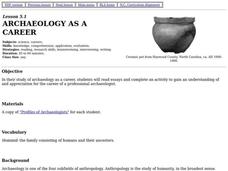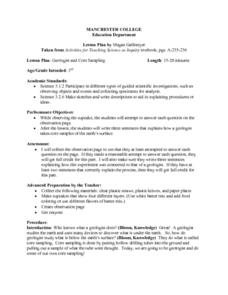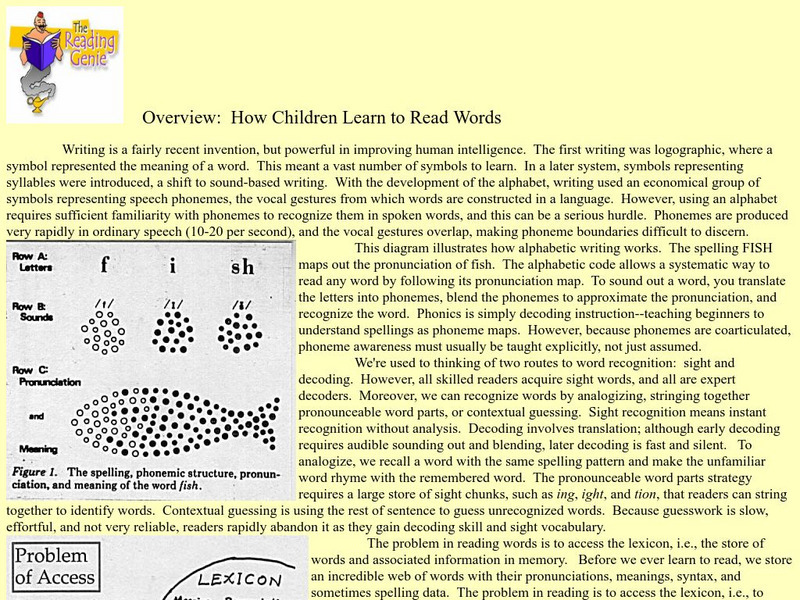Curated OER
Gandhi Speaks Through Clothing
Student analyze how Gandhi used the way he dressed to communicate with the Indian people. Students should be able to identify some of the many layers of meaning clothing can express.
Curated OER
Crossing the Border: Practicalities
Students plan a trip for a citizen of Mexico to travel within various regions of the US. Another group plans a trip for a citizen of the US to travel to a non-tourist area of Mexico.
Curated OER
Liberation of the Garden Gnomes
Students read a lighthearted story about the controversial Garden Gnome Liberation Front. They debate the public's right to own garden gnomes. Personal - to lighten up the classroom a bit with a somewhat
Curated OER
Rainforests of the World
Fifth graders view a National Geographic video about the rainforests of the world. They create a mural of the different types of fauna.
Curated OER
Archaeology as a Career
Fourth graders read about archaeology as a career. They develop a list of questions they would like to ask an archaeologist and then actually interview an archaeologist on the future of archaeology as a career.
Curated OER
Daily Actings
Students view clips of Anna Deavere Smith's work. They interview people on video or audiotape to learn their lines, dialect, and syntax to assist them in theater. They create a play which emulates the people in which they interviewed.
Curated OER
Gaining Familiarity With Haitian Creole
High schoolers investigate the concept of Haitian Creole. They first fill out a worksheet asking for prior knowledge. Then students compare and contrast the languages of English, French, and Haitian Creole. They define Creole and discuss...
Curated OER
Green Leaves
Third graders, after having conducted one experiment three times, record their observations results in a chart. They predict what hidden colors they believe that a leaf holds. Students record their predictions in their science note books...
Curated OER
Science Lesson #2
Fourth graders explore and experiment with objects that float to see if they float differently in salt water or fresh water. After the experiment, they write a paragraph in their science journal explaining how fresh water and ocean water...
Curated OER
Go Fish
First graders explore rhyming words. They listen to the book One Fish, Two Fish, Red Fish, Blue Fish and discuss the rhyming words. After being placed into groups, they play the game, "Go Fish" and find matching rhyming words. They...
Curated OER
How Do You Know There is Air in a Bag?
Fourth graders explore air as a material substance. Through experimentation and discussion, they explore how air can be classified as a material substance. Students write three examples proving that air is a material substance in their...
Curated OER
Who's There
Fifth graders, in groups, make a list of at least three animals that would survive well in a particular environment. After an allotted time, they pass their list to another group, where they will add to it. They discuss adaptations each...
Curated OER
Geologist and Core Sampling
Third graders observe a cupcake and attempt to answer each question on the observation page. They write three sentences that explains how a geologist takes core samples of the earth's surface. Students make sketches and write...
Curated OER
Statistics and Probility
Seventh graders collect data and make predictions. In this geometry instructional activity, 7th graders work in tiers collecting data and plotting it. They make inferences and predictions about their collected data.
Curated OER
Paulo Coehlo's The Alchemist
In the allegory worksheet students analyze Paulo Coelho's novel, The Alchemist. Students analyze allegorical elements by answering guided questions.
Curated OER
Going to the Doctor
Fifth graders discuss reasons for going to the doctor. For this doctor's visit lesson, 5th graders read a chapter from the text and complete a checkup word search to match definitions and terms. Students answer questions at the end of...
Department of Defense
Do Dea: In the Beginning
This expansive self-guided unit hits on many objectives such as analyzing literature for author's purpose, figuring out the main idea/theme, understanding historical criticism, comparing and contrasting works from major historical...
Quia
Quia: Online Stories
This site focuses on beginning, medial, and ending sounds. It offers a collection of games, exercises, and activities to teach letter sounds including beginning letters, phonemes, and ending sounds to emergent readers. These sites...
Auburn University
Auburn University: How Children Learn to Read Words
How do children really learn to read words? This resource offers insight into this complicated but exciting journey of putting sounds and words together to learn the joy of reading. Come and discover more.
Wisc-Online
Wisc Online: English Words of French Origin
In this learning activity, students read and listen to English words from the French language.
British Library
British Library: Teaching Resources: Romeo and Juliet: Words, Poetry & Plagiarism
In these activities, students will conduct a close linguistic exploration of the Romeo and Juliet text, which considers the central and deadly role that words play in the lovers' fate. They will also engage in broader tasks that...
Georgia Department of Education
Ga Virtual Learning: Comparative and Contemporary Mythology
This is a unit on comparative and contemporary mythology which discusses how the myths from various cultures have similar themes, linguistics, structure, and/or psychological forces. It also discusses the influences of mythology on...
Countries and Their Cultures
Countries and Their Cultures: Karamojong
The Karamojong are a pastoral group who inhabit the plateau region of Uganda. Linguistically, the Karamojong belong to the Central Group of the Nilote Language Family, which also includes several neighboring groups that speak a mutually...
Curated OER
Educational Technology Clearinghouse: Maps Etc: South China, 1971
"South China comprises the drainage basins of the middle and lower Yangtze River, the basin of the His Chiang (West River) in Kwangtung and Kwangsi; and the mountainous coastal provinces of Fukien and Chekiang. The division between the...























